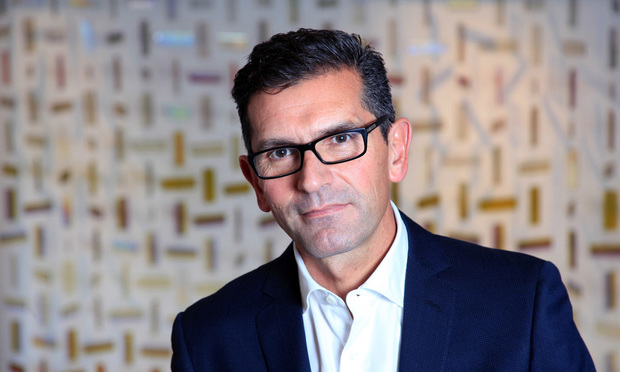Baker McKenzie Is Building for the Future With Paul Rawlinson's Blueprint
The firm is still recovering from its leader's death as it continues the mammoth task of preparing for an uncertain world.
September 24, 2019 at 05:30 AM
14 minute read
 Paul Rawlinson, Baker McKenzie's former global chair, died in April.
Paul Rawlinson, Baker McKenzie's former global chair, died in April.
Two and a half years ago, newly elected Baker McKenzie chair Paul Rawlinson laid out his 2020 vision for the international juggernaut. He introduced bold changes, among them focusing the firm in core areas, planning to integrate its financial system, pushing determinedly into transactional work, and aiming to dramatically increase bench strength in the world's biggest legal markets.
Baker McKenzie wasn't alone in its overhaul. Global firms existing in these uncertain times are attempting to shore themselves up against an ever-competitive industry and an unstable geopolitical system.
There are shifting tides a firm can prepare to handle, but the sudden death of a figurehead isn't among them.
Hailed as a visionary leader at the time of his election in 2016, Rawlinson died in April. His cause of death hasn't been made public. It followed six months after he took leave from his position to deal with medical issues caused by exhaustion.
Rawlinson's death came as a shock to his industry colleagues and peers—and his firm is still reeling as it continues the mammoth task of preparing for an uncertain world. As Baker McKenzie comes to terms with the short- and long-term effects of Rawlinson's death, it's been forced to carry out a future-proofing mission without the guidance and leadership of the man who drew it up. Can the vision survive?
A Leader Lost
The partners and staff at Baker McKenzie recognize Rawlinson's significance to the firm.
"The impact it had internally was and still is a huge deal—significantly more than people who joined the firm afterward might have anticipated," a partner in the firm's Europe, Middle East and Africa arm, who joined the firm after Rawlinson died, says.
 Samantha Mobley
Samantha MobleyFor London management committee member Samantha Mobley, Rawlinson's death was "absolutely devastating." The two had long been friends and colleagues. She acknowledges the magnitude of his loss, both for the business and its people, especially given his pivotal role in the firm's future planning.
"Paul's arrival as the chair charted us on a new strategy to transform our firm," Mobley says. "He set out a vision that would ensure it remains relevant as we go forward in an increasingly competitive marketplace."
Jaime Trujillo has held the firm's acting chair role for the past year, since Rawlinson stepped away. But in mid-September, the firm narrowed its field to three contenders in a chair election expected to take place in October: Fiona Carlin, head of the firm's new financially integrated EMEA+ business; Hong Kong managing partner Milton Cheng; and North America CEO Colin Murray.
The Plan
Rawlinson's 2020 strategy focused on several key areas, the most laborious of which is the firm's ongoing push to create and maintain a more closely aligned global business.
Baker McKenzie is one of a few historically international law firms. Founded in Chicago in 1949, it established a non-U.S. presence when it opened in Venezuela six years later, and added further offices across the Asia-Pacific region in quick succession.
Dentons global chairman Joe Andrew says Baker McKenzie "changed the legal profession."
"They were the first global firm, and they took a significant number of risks to do what they did when they did it," he says. "They deserve a huge amount of credit for that."
But the firm's first-mover advantage also created an issue it now has to contend with, Andrew argues. Having grown up before the internet and easy international communication, the firm's decisions were more likely to be made office by office. Shifting away from that approach is something all firms with long histories have to deal with, Andrew explains.
"Historically, organizations had to have a structure that allowed more local decision-making, on one hand, but more hierarchical, rule-based management on the other hand, because there was no way to quickly speak to leadership," Andrew says. "That is why all organizations had stricter hierarchies and were much slower to make decisions."
For Baker McKenzie, the first law firm to operate as a Swiss verein, beginning in 2004, changing that structure is all the more difficult. With nearly 5,000 lawyers spread across more than 75 offices and $2.9 billion in revenue, it is an enormous ship to redirect.
Nonetheless, the firm has made dramatic progress in the past year to shift away from a siloed approach, led by two significant projects. It is at once integrating its profit pools and streamlining its support staff workforce, in order to boost profitability and move away from a focus on office and practice productivity. The latter effort aims to encourage the firm's offices to work more closely together, and to free up capital to allow the firm to make investment decisions more quickly.
Baker McKenzie currently operates three profit pools across its three business lines globally: in Europe, the Middle East and Africa; the Americas; and Asia-Pacific. The majority of its offices in those areas now share profits, with EMEA only recently moving to the new approach. The firm rolled out a financially integrated structure in the region last year, dubbed the EMEA+ network. Sixteen offices, comprising about 2,000 people, including 275 partners, now sit within the network and share profits as a result. Mobley says the change has removed impediments to collaboration.
"We no longer have long discussions about whether one office should send a secondee to a client if it's mostly benefiting another office," she says. "We just get on and do it."
While the majority of the offices in the firm's Americas business have been financially integrated for some time, the firm has rolled out measures designed to improve collaboration, North America chair Duane Webber says.
"We've been collaborative for a long time, but when we peeled back the layers we realized there was more to do," he says.
 Duane Webber
Duane WebberAccording to Webber, a change to the firm's remuneration system, which The American Lawyer reported earlier this year, is an important part of the process. Partners are no longer able to see how much they and others are paid. Instead, they can view a pay scale that charts how different pay brackets correlate to commendable behaviors.
Tony Williams, principal of Jomati Consultants, a U.K.-based international management consultancy, says such messaging has a big impact on collaboration within firms.
"Getting lawyers to think outside their own geography and practice areas is always a challenge, no matter what kind of firm you are," he says. "Everybody grapples with that. The incentives the firm has introduced to encourage integration get that message across quickly."
Webber, who joined the firm's management committee when Rawlinson was appointed chair, is confident that the firm's strategic focus will not be affected by its leader's death.
"Via those directional changes, Paul was playing back to the partners what they were asking for," Webber says. "That strategy doesn't change."
At Clients' Command
Baker McKenzie moved to an industry-sector focus in 2016, highlighting clients it wanted to bring closer. Each key client identified in an industry group has a team of client service directors responsible for organizing attorneys to service that client. The firm emphasizes diversity of location, gender and practice when fielding a team, according to acting chair Trujillo.
 Jaime Trujillo
Jaime TrujilloThe benefits of the new approach have been two-fold, Trujillo says. He describes the industry focus as "the great integrator," leading attorneys to work with a wider range of colleagues. Clients, meanwhile, benefit from the broader set of views and expertise borne by a more diverse cast of attorneys.
The new client strategy is helping the firm gain traction, Williams says.
"They have been on and continue to be on a fantastic journey," he says.
Dominique Graham, head of legal in the professional services group at executive search and consulting firm Signium, agrees, adding that market perception is shifting following the sustained effort by the firm.
"Baker McKenzie was underestimated for a long time by the market, but those close to the firm actually had a different experience," she contends. "Clients were appreciative and they were winning good mandates. Crucially, the market perception has now improved and the firm is winning more lead counsel roles as a result of its long-standing global presence—they've been in those geographies for so long it's really starting to bear fruit."
While the new approach encompasses all the firm's clients, Baker McKenzie is particularly focused on large multinationals with transactional work on offer. The firm's Asia-Pacific head, Ai Ai Wong, says the firm's international history means cross-border deals have been "in its DNA" for a long time, but the refreshed strategy reemphasized their importance.
"We weren't talking to each other as much as we should have done. With the refreshed strategy, we've streamlined how we promote ourselves, how we brand ourselves, and which clients we are focusing on," she adds.
The branding push appears to have paid dividends. The firm took first place in market research firm Acritas' ranking of global law firm brands last October. In the Asia-Pacific region, it's earned the top spot since 2017. Rawlinson was a great proponent of the region, having spent several formative years in his career in the firm's Hong Kong office, Wong says.
 Ai Ai Wong
Ai Ai WongWong, who leads the transactional group on Baker McKenzie's executive leadership committee, says the focus on that work has been a key part of building the firm's brand. Rawlinson saw the firm as a leader in the transactional space. Before becoming global chair, he had nurtured client relationships with large global corporations, including Cisco, L'Oréal, HP and British American Tobacco, and wanted Baker McKenzie to provide full-service teams to clients with the same international reach, as well as to win their big-ticket work.
"Paul knew that with the right transactional strategy, we would win lots more multinational clients. He also knew that the transactions they do can become the engine rooms of global law firms," Wong says.
While Baker McKenzie has traditionally been associated with midtier transactional work, it's making good progress, Williams says.
"The more large deals you do, the more you get. I think they've won clients' confidence, because [clients] now know that they can handle more complex and larger pieces of work," he says.
Building a Bench
Baker McKenzie is looking to continue the push by adding to its bench strength in London, New York and the West Coast.
In London—the firm's largest office with 460 lawyers and 117 partners—office managing partner Alex Chadwick is driving the effort. He has led the base since 2016, when he assumed the role from Rawlinson. Since then, the firm has hired a series of well-regarded lawyers from heavyweight firms operating in London, including Matthew Dening, the former co-head of Sidley Austin's London global finance team; Freshfields Bruckhaus Deringer finance partner Geoff O'Dea; a corporate finance team from Ropes & Gray; and a trio of transactional partners from White & Case.
According to figures provided by the firm, its London office had 117 total transactional lawyers in August 2016, including 34 partners. Three years later, those figures stand at 164 and 45, respectively. The investment is paying off, Mobley says, citing several large pieces of M&A work the office has won in recent months, including Japanese conglomerate Hitachi's $6.4 billion acquisition of a power grid business from Swiss engineering group ABB Ltd, for which the firm fielded a cross-border team in London and Tokyo.
In New York, the firm's hires include funds partner Karl Egbert from Dechert and project finance partner Emeka Chinwuba from Norton Rose Fulbright in 2018, and highly regarded transactional partner Mark Mandel from Milbank, Tweed, Hadley & McCloy this spring.
Meanwhile, the firm bolstered its transactional offering in Palo Alto, California, this summer when it brought in dealmaker Leif King from Skadden, Arps, Slate, Meagher & Flom to lead its corporate and M&A practice in California. With his addition, Baker McKenzie's Silicon Valley office has seven attorneys working on deals. Across its three California offices, in San Francisco, Palo Alto, and Los Angeles, it now has over 120 lawyers, including 24 transactional attorneys.
Just over a month before he stepped away from his role, Rawlinson spoke to The American Lawyer affiliate Legal Week about the firm's intention to build dramatically in the U.S. via a domestic merger. Trujillo says the firm is still considering "large-scale combinations," and is open to regional or smaller firms that may give it more strength. In the meantime, the firm's hiring strategy will continue. Trujillo describes the intended pace of additions as "relentless."
As it overhauled how its fee-earners work, Baker McKenzie also began paying closer attention to the role its support teams play. Last fall, it kicked off a major review of its global professional and business service teams, intent on better integrating the workforce.
The firm wants all its global teams to report into more centralized management and to run on operational lines that are as similar as possible. The review will run for another two years, during which time the firm will also expand the reach of its offshore service centers.
It currently operates centers in Manila, Philippines, and Belfast, Northern Ireland, and is creating new roles in those bases. Additionally, it has announced the launch of two new offshore centers in Tampa, Florida, and Buenos Aires. As a result of the ongoing review, the firm has cut 54 jobs in its London office, between layoffs and scrapped positions.
"We can't simply stay put," Trujillo says. "We have to adjust and become more efficient and effective."
The Next Phase
One leading partner at the firm says the firm is gearing up for the "second phase" of its strategy, set to formally launch in October at the annual partners conference.
The firm spent several months surveying its clients to produce a thought leadership report called "The Age of Hyper-Complexity," which examines clients' biggest concerns and how the firm can address them, including climate change and renewable energy, as well as the increasingly strict regulatory and compliance spaces. According to the partner, the firm has assigned partners to lead teams that will draft business plans around these particular service lines. In addition to supporting clients, the initiative gives younger lawyers at the firm an opportunity to develop their business skills, the partner says.
Graham, the Signium consultant, suggests the firm should be applauded for undertaking transformative moves earlier than necessary.
"They're bringing about these changes without a burning platform forcing them to, and that's actually amazingly rare," she says. "For me, they're a very exciting firm, and one to watch."
Like so many firms, Baker McKenzie is realigning its place in an ever-changing world. But it is also still dealing with a monumental tragedy. Observers say it has made all the right strategic maneuvers for a firm of its size—trimming unnecessary fat where appropriate, adding transactional heft in the most profitable legal markets, and carefully considering transformational moves, including mergers.
Rawlinson was a critical part of setting forth the firm's new direction to partners, and beginning to implement its many moving parts. In his absence, and because of his influence, the firm heads into the future as prepared as it can be.
When Rawlinson took up his role as global chair, some in the market viewed his genial personality as counterproductive to such a senior position. But one Baker McKenzie partner warned at the time against anybody dismissing Rawlinson, arguing that he was no pushover. Baker McKenzie's rivals would do well to remember the same about the firm he left behind as it heads boldly forward.
Email: [email protected]
This content has been archived. It is available through our partners, LexisNexis® and Bloomberg Law.
To view this content, please continue to their sites.
Not a Lexis Subscriber?
Subscribe Now
Not a Bloomberg Law Subscriber?
Subscribe Now
NOT FOR REPRINT
© 2025 ALM Global, LLC, All Rights Reserved. Request academic re-use from www.copyright.com. All other uses, submit a request to [email protected]. For more information visit Asset & Logo Licensing.
You Might Like
View All
Law Firms Look to Gen Z for AI Skills, as 'Data Becomes the Oil of Legal'

Law Firms Expand Scope of Immigration Expertise Amid Blitz of Trump Orders
6 minute read
Losses Mount at Morris Manning, but Departing Ex-Chair Stays Bullish About His Old Firm's Future
5 minute read
Trending Stories
- 1Uber Files RICO Suit Against Plaintiff-Side Firms Alleging Fraudulent Injury Claims
- 2The Law Firm Disrupted: Scrutinizing the Elephant More Than the Mouse
- 3Inherent Diminished Value Damages Unavailable to 3rd-Party Claimants, Court Says
- 4Pa. Defense Firm Sued by Client Over Ex-Eagles Player's $43.5M Med Mal Win
- 5Losses Mount at Morris Manning, but Departing Ex-Chair Stays Bullish About His Old Firm's Future
Who Got The Work
J. Brugh Lower of Gibbons has entered an appearance for industrial equipment supplier Devco Corporation in a pending trademark infringement lawsuit. The suit, accusing the defendant of selling knock-off Graco products, was filed Dec. 18 in New Jersey District Court by Rivkin Radler on behalf of Graco Inc. and Graco Minnesota. The case, assigned to U.S. District Judge Zahid N. Quraishi, is 3:24-cv-11294, Graco Inc. et al v. Devco Corporation.
Who Got The Work
Rebecca Maller-Stein and Kent A. Yalowitz of Arnold & Porter Kaye Scholer have entered their appearances for Hanaco Venture Capital and its executives, Lior Prosor and David Frankel, in a pending securities lawsuit. The action, filed on Dec. 24 in New York Southern District Court by Zell, Aron & Co. on behalf of Goldeneye Advisors, accuses the defendants of negligently and fraudulently managing the plaintiff's $1 million investment. The case, assigned to U.S. District Judge Vernon S. Broderick, is 1:24-cv-09918, Goldeneye Advisors, LLC v. Hanaco Venture Capital, Ltd. et al.
Who Got The Work
Attorneys from A&O Shearman has stepped in as defense counsel for Toronto-Dominion Bank and other defendants in a pending securities class action. The suit, filed Dec. 11 in New York Southern District Court by Bleichmar Fonti & Auld, accuses the defendants of concealing the bank's 'pervasive' deficiencies in regards to its compliance with the Bank Secrecy Act and the quality of its anti-money laundering controls. The case, assigned to U.S. District Judge Arun Subramanian, is 1:24-cv-09445, Gonzalez v. The Toronto-Dominion Bank et al.
Who Got The Work
Crown Castle International, a Pennsylvania company providing shared communications infrastructure, has turned to Luke D. Wolf of Gordon Rees Scully Mansukhani to fend off a pending breach-of-contract lawsuit. The court action, filed Nov. 25 in Michigan Eastern District Court by Hooper Hathaway PC on behalf of The Town Residences LLC, accuses Crown Castle of failing to transfer approximately $30,000 in utility payments from T-Mobile in breach of a roof-top lease and assignment agreement. The case, assigned to U.S. District Judge Susan K. Declercq, is 2:24-cv-13131, The Town Residences LLC v. T-Mobile US, Inc. et al.
Who Got The Work
Wilfred P. Coronato and Daniel M. Schwartz of McCarter & English have stepped in as defense counsel to Electrolux Home Products Inc. in a pending product liability lawsuit. The court action, filed Nov. 26 in New York Eastern District Court by Poulos Lopiccolo PC and Nagel Rice LLP on behalf of David Stern, alleges that the defendant's refrigerators’ drawers and shelving repeatedly break and fall apart within months after purchase. The case, assigned to U.S. District Judge Joan M. Azrack, is 2:24-cv-08204, Stern v. Electrolux Home Products, Inc.
Featured Firms
Law Offices of Gary Martin Hays & Associates, P.C.
(470) 294-1674
Law Offices of Mark E. Salomone
(857) 444-6468
Smith & Hassler
(713) 739-1250










